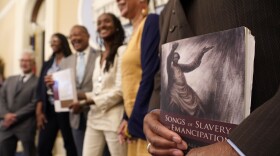
Egyptians welcomed military rule Friday with a massive display of joy.
Protesters across Cairo reveled at the victory they had wrought, and Egyptian reporters on cable TV channels were reduced to tears as they sought to convey their happiness.
But many questions remain about what comes next — and there are strong doubts about whether military rule will lead to the demonstrators' ultimate goal: a credible transition to democracy.
"The heavy lifting begins now," says Robert Springborg, a professor at the U.S. Naval Postgraduate School. "Now is the time for the military to confront its moment of truth."
More Questions Than Answers
Recently appointed Egyptian Vice President Omar Suleiman announced the dramatic shift in a simple, one-sentence address on state TV. He said President Hosni Mubarak had decided to waive his office as president and asked "the Armed Forces Supreme Council to run the state."
As with just about every official pronouncement these past two weeks, it left many more questions than answers. Will a new, more democratic constitution be created and when? Will the Parliament, filled with Mubarak loyalists, be dissolved? Will elections scheduled for September go ahead, be rescheduled or be put off? And what about the opposition leaders who've emerged over the past three weeks?
If the Ministry of Interior, the police, and all of that stays around, it's hard to see how Egyptians' daily lives would be substantively improved a year from now.
"We don't know how this new military junta will interact with them," says David Patel of Cornell University. "Will it just consult with them? Even if the military today says it wants early elections, the question is whether that opposition is part of this interim regime."
During 18 days of street demonstrations, there were numerous signs that the military — or at least some junior members — were siding with protesters. Some stood together with protesters on military tanks and some outright joined the ranks in Tahrir Square. On Friday, before the takeover announcement, military personnel in Alexandria handed out water bottles to demonstrators. A growing number of protesters had been asking for what they call "the people's army" to step in and launch a coup.
Still, Jason Brownlee, of the University of Texas, Austin, questions whether Egypt's military really has a sovereign, civilian government in mind.
"I don't see evidence the military is willing to go backstage," he says. The message could be "we've heard you, we've responded, congratulations, now go home."
Brownlee thinks protesters might keep more of their new leverage if they maintain a peaceful presence on the streets, pushing for broader change in the overall security regime. "If the Ministry of Interior, the police, and all of that stays around," he says, "it's hard to see how Egyptians' daily lives would be substantively improved a year from now."
Protesters have made clear they want not only Mubarak's departure but true regime change.
"There are tens of thousands of members of the regime and the military-industrial complex," analyst Patel says. "How many of those people are going to see their patronage-based positions challenged?"
Springborg, of the U.S. Naval Postgraduate School, says Egypt's military has ossified for decades, with little role other than to support the president. The institution "needs to be modernized and subject to civilian control," he says. "They're going to fight that and it's going to be a huge issue."
Egypt's Long Military History
Egypt's military has been integral to governance ever since it staged a revolt against the Egyptian monarchy and its British advisers in 1952.
That's when Col. Gamal Abdel Nasser led a clandestine group of junior "Free Officers" to seize power, with the aim of modernizing and democratizing Egypt. But the leadership was beset with infighting. Nasser's plans for a vibrant socialist economy foundered. A fairly liberal constitution was eventually written, but never implemented.
Today's top military officials see themselves as the heirs of those Free Officers. But Robert Scales, the former commandant of the U.S. Army War College, says there's a generational split that could prove crucial.
"One is the old guard represented by Field Marshal Tantawi, and [recently named vice president Omar] Suleiman and others, and then you have the young guard, those who came up in the Egyptian army after the '73 Yom Kippur War. And what you see is a sort of internal tension that seems to be evolving inside the army, as one part seeks to hold on to the old and the younger generation looks for the new."
Scales notes the older generation was trained by the Soviets, while the younger one has been trained and educated by the U.S., "and so there really is a cultural rift."
Military Links To Economy
On Friday, Egypt's military said that Defense Minister Tantawi was presiding over the Supreme Council, the military body that has taken control of the state.

Top commanders, all with strong political ties to Mubarak, may have decided they needed to break with him for the sake of their own legitimacy. But they still have a vital stake in the status quo, not just politically but also economically.
In a strange public-private alliance forged decades ago, Egyptian military officers own a share in just about every industry in the country, from road construction to car assembly to tourism. This could lead to a serious clash with protesters who've been calling for an end to corruption and for Mubarak to be put on trial.
"To investigate the transgressions of the regime is to take it directly into the military economy," says Springborg. Military leaders have "less than zero interest in having an investigation of that."
The military on Friday also said it would end the 30-year-old state of emergency "as soon as the current circumstances are over." And that it would oversee a revision of the constitution to allow "free and fair presidential elections."
But rewriting a constitution is a long and complicated process. So far, the opposition that's coalesced on the streets of Cairo and other cities has agreed on one key thing: Mubarak's departure. Whether they can agree on broader goals during a protracted debate on constitutional policy is an open question.
Springborg suspects that a real constitutional overhaul is not on the military's agenda. The current document heavily centralizes power in a strong president, something he believes top commanders are loath to change.
"I think the military would breathe a sigh of relief if they had a successful [presidential] candidate under the current constitution," he says. "Someone who won't challenge its privileges and powers."
Copyright 2022 NPR. To see more, visit https://www.npr.org. 9(MDAzMjM2NDYzMDEyMzc1Njk5NjAxNzY3OQ001))





















